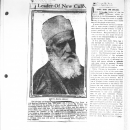Main menu
- ‘Abdu’l-Bahá’s Journey
- World Peace
- Stopping Racism in America
- Empowerment of Women
- More Principles...
- Prayer for America
‘Abdu’l-Bahá and Chicago
‘Abdu’l-Bahá, the leader of the impressive Bahá’í movement which has sprung up to the Mohammedan world, is coming to Chicago this month to attend — strange to say — the international conference of the people of his faith.
It seems odd that a movement which is still, to most people, a Persian phenomenon should propose actually to hold its annual gathering in the heart of the United States. But that seems to be the case, and one can only judge of the real extent of its cosmopolitanism by observing the conference itself.
It is a pity that ‘Abdu’l-Bahá has to talk through an interpreter. It would be hard to find anybody coming out of the Mohammedan world whose views of Christianity and the Western World would be more interesting or even impressive. The Bahá’í movement, with its large generalizations of the universal brotherhood of man, the unity of all religions and creeds, and of universal tolerance and peace, affords a splendid scale upon which to measure Western achievements. But this can’t be easily conveyed through an interpreter.
While Chicago is hospitable to cults and movements, it is, at the same time, rather inclined to lump them all together, to judge them from the features which seem to our eyes to be bizarre. But it would be a pity if this habitual discounting of Eastern faiths should mean that in our local treatment of the Bahá’í conference the real worth of the venerable leader of that faith should be unappreciated. Nothing could be more inept, more discreditable to our own intelligence, than to put this venerable Persian teacher in the fakir class. At the Universal Congress of Races last year he seems to have made a deep impression upon the delegates, and they were men of the highest intellectual attainments. The Bahá’í faith will not silence the thousand raucous noises of the City of Chicago in this year of grace, but it will probably encourage some to reflect afresh upon the large irenic generalizations which inspire the ‘Abdu’l-Bahá and his followers.
[picture caption: ‘Abdu’l-Bahá Abbas
The Persian philosopher and leader has arrived in New York. He was born in Teheran in 1844. His father was a prince of Persia’s royal line, who gave up his position to strive for the regeneration of man. For advocating liberal ideas he was thrown into prison, and his young son ‘Abdu’l-Bahá went with him. In 1908, after the Young Turks came to power, ‘Abdu’l-Bahá was released and at once took up the work of his father. He estimates the number of his followers at about 2,000,000, about 5,000 of these being in this country. The basis of his teachings is human solidarity. He believes that all nations and religions should be united. His followers include Catholics, Protestants, Jews and Mohammedans. He will lecture in various cities and will attend the International Peace Conference at Lake Mohonk.]









